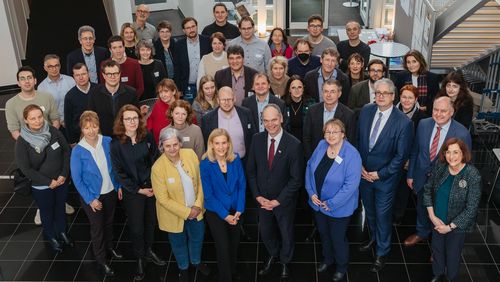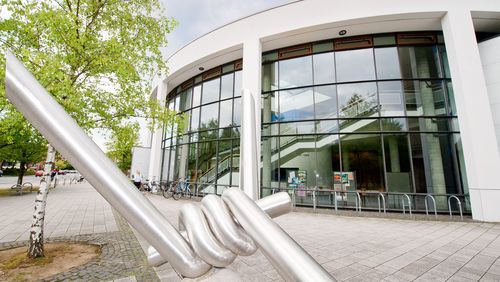Universities play a much greater role in continuing education and training today than they did ten years ago. Continuing education expert Anke Hanft and education scientist Karsten Speck talk about the changes in Germany's higher education system and look ahead to future challenges.
With around 250 million euros in funding, 101 participating universities and more than 370 academic continuing education courses – the joint Federal Government-Länder programme "Advancement through Education: Open University" has clearly made its mark in Germany's higher education landscape. The programme was launched in 2011 and provided funding to promote continuing education at competitively selected higher education institutions over ten years. This spring it came to an end.
The goal of the project was to bring vocational and academic education closer together. Anke Hanft, Professor of Continuing Education and Director of the Centre for Lifelong Learning at the University of Oldenburg, was involved from the very beginning. "With an international comparative study commissioned by the Federal Ministry of Education and Research, we provided the main impetus for the planning of the programme," she says.
The study showed that in an international comparison there was too little exchange between the German vocational education and training system and the higher education system – a major disadvantage that needed to be addressed. After all, as Hanft stresses, the close interlinking of vocational training and academic education not only ensures more flexible career paths, lifelong learning and increased opportunities for individual advancement: "Academic continuing education also promotes the transfer of knowledge between higher education institutions, companies and society."
"The C3L set new standards"
Just over a decade after the programme was launched, the situation has changed profoundly: "We have reached key milestones in recent years," says education scientist Professor Karsten Speck. Speck was involved in the scientific monitoring and support of the programme, as were Hanft and Dr Annika Maschwitz, who was previously at Oldenburg and is now Professor of Lifelong Learning at the Bremen University of Applied Sciences. Working together in a nationwide network encompassing higher education institutions and the Centre for Higher Education (CHE), the three education experts evaluated the implementation of the programme, provided support for individual projects, and helped to ensure that the results, such as new courses and study programmes, were better integrated at universities.
From this perspective, too, Hanft and Speck consider the programme to have been a success. They note that in addition to the launch of new continuing education courses, teaching staff were trained and new digital teaching and learning formats set up, the latter having long since become an integral component of undergraduate teaching. New forms of cooperation between companies and universities were also established, as well as new target groups. "This is something we can really grow with, also with projects in Oldenburg," says Speck.
Access to higher education without Abitur
And the list continues: permanent centres for continuing education have been established at higher education institutions across Germany. The University of Oldenburg was a pioneer in this area with its C3L – Centre for Lifelong Learning, which was founded in 2006 on the basis of foregoing institutes. "The C3L has set new standards," says Speck, pointing to another goal of the programme: to open up universities to non-traditional target groups – through academic continuing education, but also through projects like the KinderUni (University for Children), guest student programmes, and the Z-Prüfung, which gives working persons who have no university entrance qualification access to university studies.
All these developments have made continuing education at universities more professional and more present in the political consciousness, according to Hanft and Speck. Nevertheless, both experts also see certain shortcomings, for example that access to higher education is still difficult for those who work and have families, for the unemployed, and for certain occupational groups, such as those in the health and care sector. "Most continuing education programmes are fee-based, making them unappealing to these target groups," Hanft explains.
One reason for this is the precarious status of continuing education programmes and centres, as Speck and colleagues from the FernUniversität in Hagen, TU Dortmund University and the CHE point out in a report summarising the findings of the research accompanying the programme. Although the higher education laws of Germany's federal states see continuing higher education as a core task of universities alongside research and teaching, there is a lack of systematic funding. "This is a challenge that politicians and higher education institutions must address if they are serious about fulfilling this task," stresses Hanft.
Flexible study programmes needed
In her view, however, public universities should generally be allowed to generate income through fee-based study programmes: "This opens the door for innovations that also benefit undergraduate teaching and research," she says. Hanft and Speck make the case for a mixed model in which a combination of fee-financed and free degree programmes opens up higher education to various target groups – from nurses to business managers. One way to achieve this is more flexible undergraduate programmes that make it easier for those who want to to study part-time, in structures and formats that fit their needs, says Speck.
Both researchers are aware that this remains a considerable challenge. In their view, many of the programmes on offer to date are too inflexible. To make undergraduate degree programmes more attractive for people who are already working, the modular structure would have to be reinforced. "And we must move away from rigid adherence to relatively fixed standard times to degree," says Hanft, noting that the coronavirus crisis is also highlighting how important flexible studying structures are. "In this way we can support lifelong learning at universities in a sustainable manner," she says. However, to ensure that what has been achieved so far is not lost once the major funding programmes come to an end, academic continuing education must assume the position it deserves in Hanft and Speck's view: a place at the centre of universities and thus at the centre of higher education culture.
In addition to providing scientific support for the "Advancement through Education" programme as a whole, the University of Oldenburg coordinated the joint projects PuG (Development of Part-Time Study Programmes in Nursing and Health Sciences) and mint.online (Establishment of Part-Time Study Programmes in STEM Subjects), and was also involved in three other projects. This has resulted in a number of continuing education courses at various higher education institutions.




